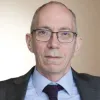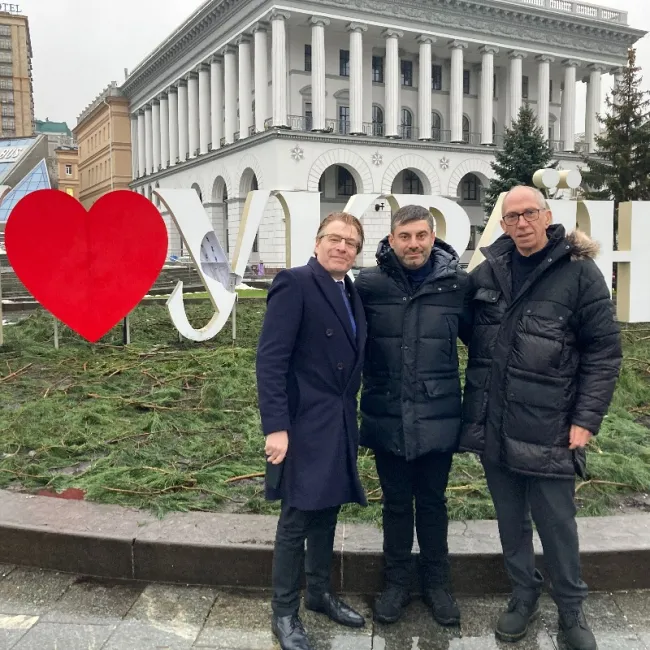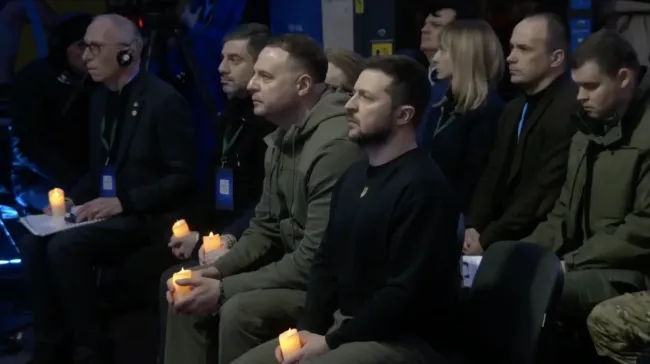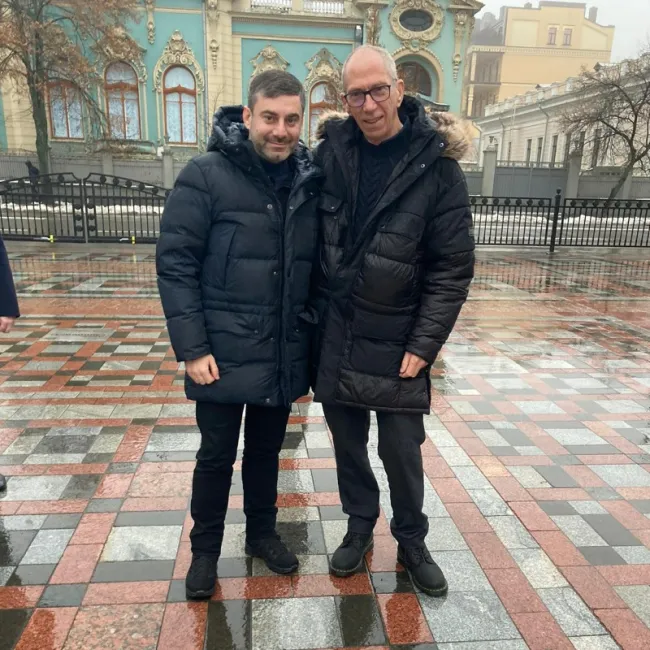
On 6 December 2022, I travelled to Warsaw, Poland to meet Chris Field, World President of the International Ombudsman Institute (IOI) and Ombudsman of Western Australia, to prepare for our working visit to Ukraine from 7-12 December 2022.
We had been invited by Dmytro Lubinets, the relatively new Ukrainian Parliamentary Human Rights Commissioner (Ombudsman) to:
- speak at a conference to mark Human Rights Day
- visit the Commissioner’s office
- tour Kyiv and Irpin, both badly affected by the illegal Russian invasion.
Ombudsman Dmytro Lubinets was keen for the IOI to visit Ukraine and witness first-hand the challenges facing a national Ombudsman in wartime. Chris wanted Europe represented in the delegation and asked me to join him and I accepted his invitation.
A great honour
For me, and for PHSO, it was a great honour to be invited. As Vice-President of IOI Europe, I played an active role in arguing that the Russian Human Rights Commission (Ombudsman) was neither independent nor impartial and that it had become a mouthpiece for Kremlin views. After agonising debates at the IOI World Board we voted by 16 votes to nil in favour of its expulsion, with 4 abstentions.
This has not stopped bilateral discussions between the Ukrainian and Russian Ombuds on issues such as the exchange of prisoners. But it means Russia cannot falsely claim it has a national Ombuds scheme that meets international standards.
A committed and respected Ombudsman
I had met Ombudsman Lubinets several weeks before when he visited the UK. I was quickly impressed with his seriousness and dedication, qualities he had already shown as an MP and as Chair of the Ukrainian Parliament’s Human Rights Committee.
From the word ‘go’ Lubinets demonstrated his commitment. He travelled all the way from Kyiv by car to meet us at Rzeszow, near the Polish border, and escorted us (in an armed convoy provided by the Ukrainian Security Services) to Kyiv. This illustrated the importance the Ukrainians attached to our visit.
We met some Ukrainian soldiers outside the airport who were doing their training in Poland. They thanked us for coming and asked Lubinets for night-vision glasses so they could function against Russian night attacks. We took heart not only from the welcome but from the fact that Lubinets is clearly a recognised and respected figure in Ukraine.
Kyiv: a chastening experience
After nine hours in the car convoy, approaching Kyiv for the first time was chastening. No electric lights on, candles in windows, little traffic, blockades, restricted zones, a curfew and freezing temperatures.
We were taken to an old Soviet-style hotel in the administrative centre. The Ombudsman’s office was in the same building and had its own bomb shelter, so when sirens went off we didn’t need to go outside.
I said ‘thank you and goodnight’ to my bodyguards. They laughed at me, explaining that two of them would be outside my room all night in case of an incident. They never once left our sides through all our public engagements and meals. They were professional, patient, discreet and generous.
Human Rights in Dark Hours
The next morning we were guests and speakers at the Human Rights in Dark Hours conference, co-organised by the President’s Office and the Ombudsman. For security reasons, the event took place deep underground in a metro station. The conference was staged on a platform with trains running through on both sides and attended by 300 people, all of whom were given blue and yellow blankets to keep warm.
Organisation of the event was highly professional and it was broadcast on national television. After being dusted down with make-up, it was memorable to be introduced to President Zelensky. He joined other participants in a short candle-lit vigil, remembering the human rights atrocities of recent months.
President Zelensky spoke without notes and with the aid of simultaneous translation. Putting the struggle in a historical context, he signalled a determination and resolution to resist the elimination of Ukrainian independence. He thanked Chris Field and the IOI for their demonstration of solidarity.
“We’ll meet again,
Don’t know where, don’t know when
But I know we’ll meet again
Some sunny day.”
At the start of the conference, the organisers played Vera Lynn singing “We’ll meet again”. In my address I noted the similarities between Kyiv in 2022 and London in 1940.
I explained the role and scope of the UK Ombudsman, our part in the expulsion of Russia from the IOI, the centrality of independence and impartiality in national Ombuds institutions. I also emphasised the strong support the UK public had for the cause of Ukrainian independence against illegal invasion.
I then asked Ombudsman Lubinets a series of questions about the war, its impact on children’s rights and on citizens inside and outside Ukraine.
You can read an official Ukrainian account of the conference and its context (it contains some graphic detail).
No weekends in Ukraine
As one of the Ombudsman’s staff told me, “There are no weekends in Ukraine”. So on Saturday 10 December, we spent the morning at the Ombudsman’s office. A team of about 250 people work for the Ombudsman across 26 regional offices, two of which have been destroyed by Russian bombing.
We met the Ombudsman’s staff and attended the inaugural meeting of the (Advisory) Coordination Council. This was made up of representatives of human rights organisations across the country.
We then called on Parliament’s Speaker, Ruslan Stefanchuk for a cordial conversation. We received his thanks for making what he called an “historic visit”.
“This [visit] is an example of professionalism and courage for the leaders of the world’s human rights institutions. You demonstrate your commitment to the ideals of human rights and freedom not in words, but in deeds.”
I was able to report on the excellent development of the Ombudsman office under Lubinets but pointed out the central need for him to retain complete independence from Parliament. And that relations between Parliament and Ombudsman are a vital sign of the health of a democratic society.
A determination to choose freedom
After this we visited central parts of Kyiv, including Maidan Square and its memorials to fallen soldiers, abandoned Russian tanks and Maryinski Park. Here, we visited one of the Ombudsman’s innovative “Invincibility Points”. These are guarded and heated tents with IT access, hot water and beds for Ukrainians whose houses have been destroyed or who have no electricity or water.
On 11 December we travelled to Irpin, the town closest to Kyiv. The Russians reached there earlier this year, destroying 70% of buildings, and killing and displacing many civilians.
We were shown around by the Deputy Mayor. The quiet but unmistakable determination to choose freedom with all its challenges over Russian domination was palpable.
Future links with Ukraine
Each evening we were entertained quietly by Ombudsman Lubinets and his senior team. We discussed concrete plans for the future.
I committed PHSO to an institutional link to build capacity in the Ukrainian Ombudsman’s office. This will include placements in Manchester, online seminars and policy exchange. We have much to learn from an Ombudsman in wartime.
The following day we were driven back to Warsaw in an epic journey through snow and ice, taking 13 hours. We stayed in Warsaw overnight and then went our separate ways.
Reporting on our visit
I was very pleased to support IOI President Chris Field on this visit. He needed a European voice with him. He is a seriously impressive person and a very fine Ombudsman leader.
He is generous, sensitive, brave, experienced and warm-hearted. He treats everyone in the same way be they waitresses or State Presidents. He has been a great supporter of PHSO and the visit strengthened our ties. You can read his final report on this trip on the IOI website.
My letter to the Foreign Secretary reporting on the visit is available to download. You can also hear me talk about the visit on the Ombudsman Association’s podcast.




